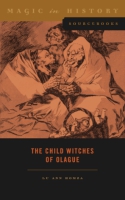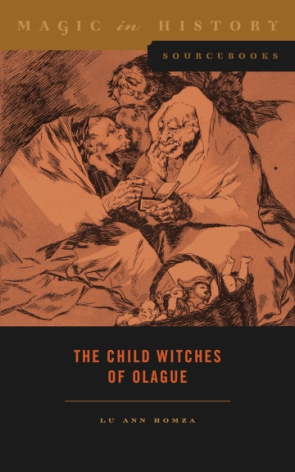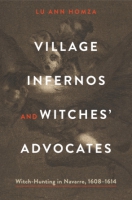The Child Witches of Olague
Lu Ann Homza
“These invaluable cases will be of immense interest to anyone interested in the histories of early modern Spain, the Spanish Inquisition, witchcraft, law, popular culture, and childhood, among other topics. By opening up new perspectives on a famous set of witchcraft cases, Homza’s collection offers new insights into social and familial dynamics that could fuel seemingly ‘irrational’ crazes. This is an outstanding resource for the study of early modern social, family, religious, and legal history.”
- Description
- Reviews
- Bio
- Table of Contents
- Sample Chapters
- Subjects
Drawing from Spanish-language sources only recently discovered, Homza translates and annotates three court cases from Olague in 1611 and 1612. Two were defamation trials involving the slur “witch,” and the third was a petition for divorce filed by an accused witch and wife. These cases give readers rare access to the voices of illiterate children in the early modern period. They also speak to the emotions of witch-hunting, with testimony about enraged, terrified parents turning to vigilante justice against neighbors. Together the cases highlight gender norms of the time, the profound honor code of early modern Navarre, and the power of children to alter adult lives.
With translations of Inquisition correspondence and printed pamphlets added for context, The Child Witches of Olague offers a portrait of witch-hunting as a horrific, contagious process that fractured communities. This riveting, one-of-a-kind book will appeal to anyone interested in the history of witch hunts, life in early modern Spain, and history as revealed through court testimony.
“These invaluable cases will be of immense interest to anyone interested in the histories of early modern Spain, the Spanish Inquisition, witchcraft, law, popular culture, and childhood, among other topics. By opening up new perspectives on a famous set of witchcraft cases, Homza’s collection offers new insights into social and familial dynamics that could fuel seemingly ‘irrational’ crazes. This is an outstanding resource for the study of early modern social, family, religious, and legal history.”
“These newly discovered documents in the secular and episcopal records of Pamplona enhance our knowledge of the large witch-hunt in Navarre. They contribute to the scholarly conversation about children’s testimony in witchcraft prosecutions and our knowledge of defamation cases during the early modern period. They also supply new evidence of physical violence in small early modern communities.”
Lu Ann Homza is Professor of European History at William & Mary. She is the editor of The Spanish Inquisition, 1478–1614: An Anthology of Sources and author of Religious Authority in the Spanish Renaissance and Village Infernos and Witches’ Advocates: Witch-Hunting in Navarre, 1608–1614, the last also published by Penn State University Press.
Map
Acknowledgments
Introduction
1. Prior Events
2. Father and Son
3. The Echaide Family and the Two Widows
4. Mother and Daughter
Bibliography
Index
Download a PDF sample chapter here: Introduction
Also of Interest
Mailing List
Subscribe to our mailing list and be notified about new titles, journals and catalogs.





